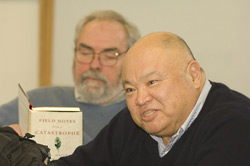Campus Update
By Greta Petry (March
26, 2007)
Spotlight on Campus Reading Project
 |
|
|
Professor Robert Nakamura (foreground) makes a point about global warming as Professor Thomas Church refers to Elizabeth Kolbert's book. (Photo by Mark Schmidt.) |
|
University at Albany students, faculty, and staff are focusing on global warming as they read and discuss Field Notes from a Catastrophe, by Elizabeth Kolbert, for the Campus Reading Project.
Kolbert, an award-winning journalist, will be on campus Thursday, March 29, for two public events offered in the Campus Center Ballroom, at 2 p.m., and at 7 p.m.
Kolbert's book was chosen from among more than 100 submissions for this semester's Campus Book Project. She explains the science of global warming, unveiling a scenario in which we are just one generation away from its devastating effects.
Downtown Campus Discussion
At a March 15 discussion in Milne Hall on the Downtown Campus, a small group of faculty and staff debated Kolbert's book. As compelling as her argument is, Associate Vice President for Academic Affairs Bill Hedberg said one had only to read The New York Times in recent weeks to see that the issue of whether to believe the science on global warming is hotly contested. One March 13 article said some scientists find the central points of Al Gore's Academy Award-winning documentary An Inconvenient Truth to be "exaggerated and erroneous." Some scientists call him an alarmist, while others give him high marks for getting the big picture right, while making minor inaccuracies.
Robert Nakamura, professor of political science and director of the Center for Legislative Development, quipped that Kolbert's book was a case of "You've seen the movie (An Inconvenient Truth), now read the book."
In many ways, said Thomas Church, professor and chair of the Department of Political Science, the information in Kolbert's book is "old news" by now, having grown out of three articles, published in spring 2005, she wrote for New Yorker magazine. There was general agreement among Church, Nakamura, Hedberg, and David Liebschutz, assistant dean for Career and Alumni Programs at Rockefeller College and a public service professor, that the message about global warming's looming consequences has been slow in permeating public consciousness.
Nakamura drew an analogy to finding a correlation between cigarette smoking and lung cancer. A generation ago, many people smoked, and tobacco companies denied that smoking increases one's risk of developing lung cancer.
Regulating Voluntary Behavior
Today that knowledge is a given. Nakamura, whose area is regulation, said regulation does not work well on changing highly dispersed and hard to monitor voluntary behaviors in our country. Changing the habits of American society, which emits nearly 25 percent of the world's greenhouse gases (according to Kolbert's book), is a hard sell in the land of opportunity.
Liebschutz noted that we Americans like our personal vehicles and driving on our interstates, a way of life very different from that of Europeans, who are far more conscientious about reducing emissions and energy consumption.
Measure Your "Carbon Dioxide Footprints"
After reading Kolbert's book about potential drought and flooding that threaten to wipe out our children's future because of global warming, what can we do?
Hedberg said changing our habits is about "a thousand different choices you make every single day." The UAlbany Energy Environmental Sustainability Task Force Web site features an Appliance Energy Cost Calculator where you can calculate your "carbon dioxide footprints" based on individual electricity usage. Nakamura noted that there may be nothing one individual can do to stave off global warming. It's your "classic conundrum," he said. "What we want collectively is different from what we want individually."
Church asked how much do we want to blame the Bush administration for ignoring the problem. "If Gore had been elected, would he have galvanized the country in a different way?" Church said.
Liebschutz responded, "It doesn't have anything to do with (the last six years of) the Bush administration. Global warming has been a trend for the last 30 to 40 years."
Nakamura said, "What would have been the outcome if Bush had declared war on global warming instead of on Iraq?" Amid laughter, he quipped, "Would we all be wearing Hawaiian shirts?" Church said that if you have "a view of little government it would be hard to imagine a solution to global warming." Kolbert would probably argue that it will be too late if we wait for a consensus on how to keep global warming from destroying our civilization.
Activities all Week
Student discussions of Kolbert's book, and lectures by experts on related topics will continue right up to the day of her visit.
Monday, March 26 - At 4 p.m. in the Standish Room of the Science Library, Professor Wei-Chyung Wang of UAlbany's Atmospheric Sciences Research Center will discuss Global Warming: Changes in Regional Climate over East China and the Northeast U.S. His lecture is free and open to the public.
Later than evening, at 5:30 p.m. in the Colonial Quad Cafeteria, Jason Benitez, residence hall director, and Celina Fletcher, Colonial Quad Coordinator, will lead a student discussion on Field Notes from a Catastrophe.
Wednesday, March 28 - Wind energy will be the topic of a lecture at 4 p.m. given by Bruce H. Bailey, president of AWS Truewind, LLC, in the Standish Room of the Science Library.
Visit the Reading Project Web site for a complete list of seminars and discussions.
